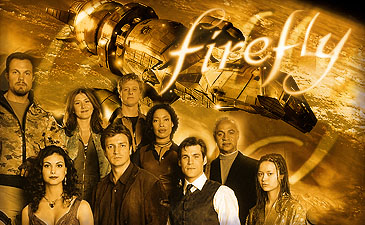
Introduction:
As a spaceship flies to a lonely, old American-west violin solo, the opening credits of Firefly cue that this isn’t a normal television series. This 2002 Joss Whedon space opera only aired eleven episodes, but in the process secured a passionate fan base, created both a comic book and book series spin off, and became the basis for the 2005 film Serenity (“Firefly (TV Series)”). Although originally criticized for being “one of the most dangerous high-concept ideas in years” (Goodman), there is an infectious appeal to Firefly that has increased its fan base since the show was cancelled and the release of the series on DVD has earned it nine awards, including an Emmy (“Firefly (2002)”).
In what initially seems to be a stock science fiction television series, Firefly follows the journey of a motley yet likeably rebellious, space transport ship crew as they travel the galaxy. However, the twist which has secured Firefly as a unique member of science fiction is its expansion upon the basic elements of a space opera. Firefly openly includes elements of American Westerns and traditional science fiction space operas. Its multifaceted appeal includes its ability to be serious while including humor, even though it is occasionally over-dramatic. As a result of its expansion upon the space opera and its engaging characters, Firefly is an uncommon and engaging work of science fiction.
SPOILER WARNING: The information in this site discusses key plot elements, including the endings of episodes and the season to date.

Links
Last Modified 24 April 2006 Created by Julie Rooney julierooney_2009@depauw.edu
Contact me